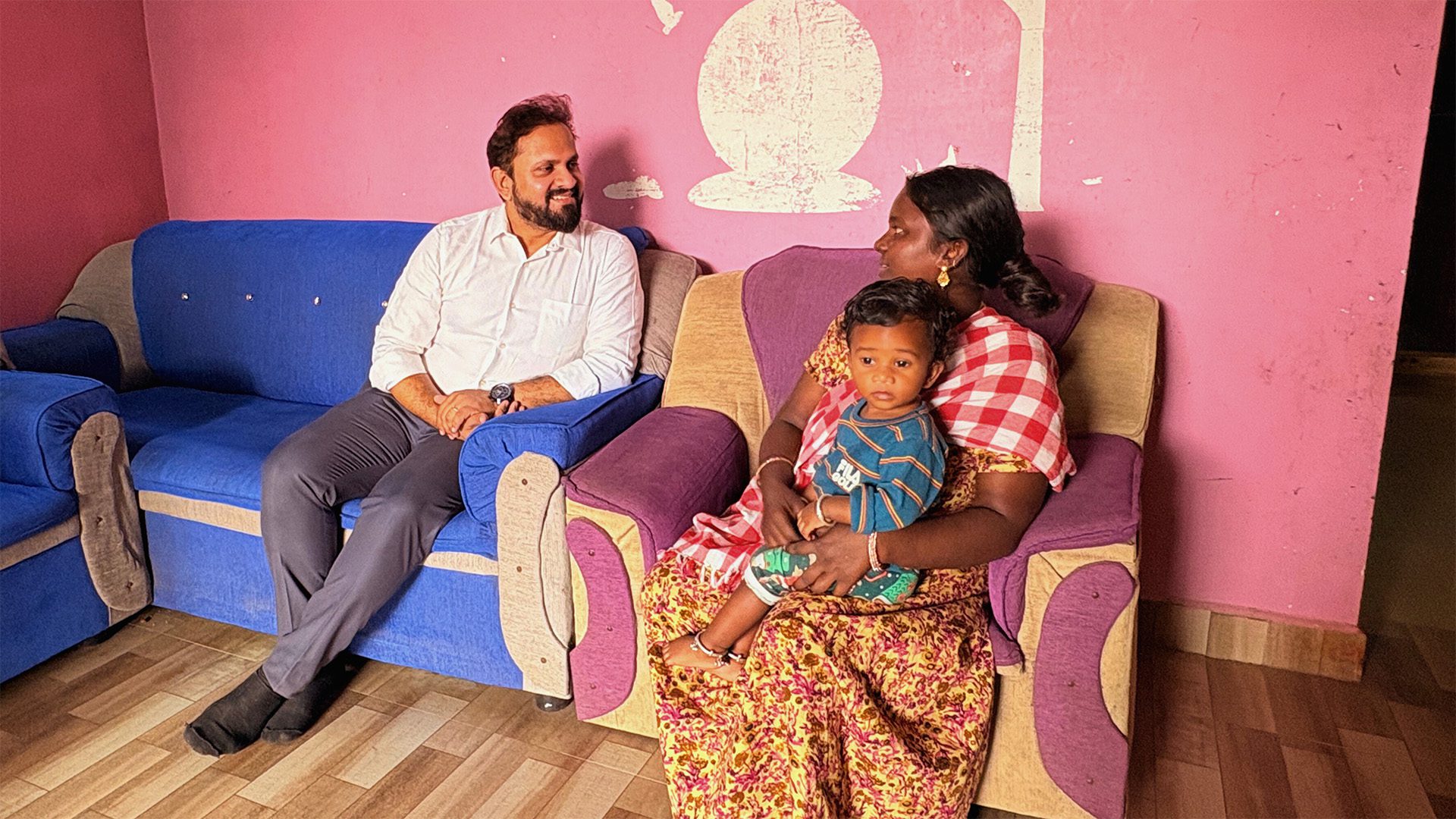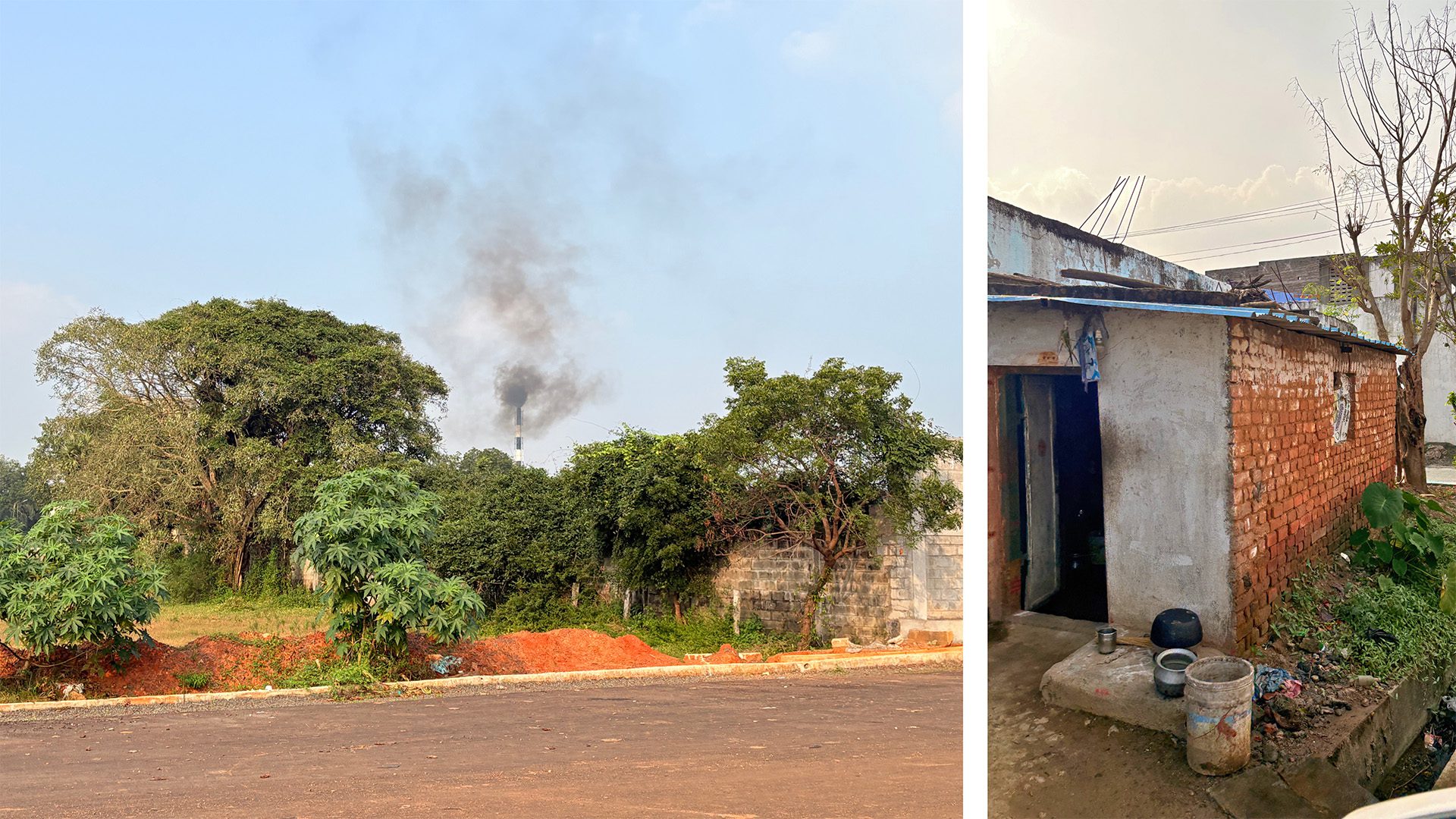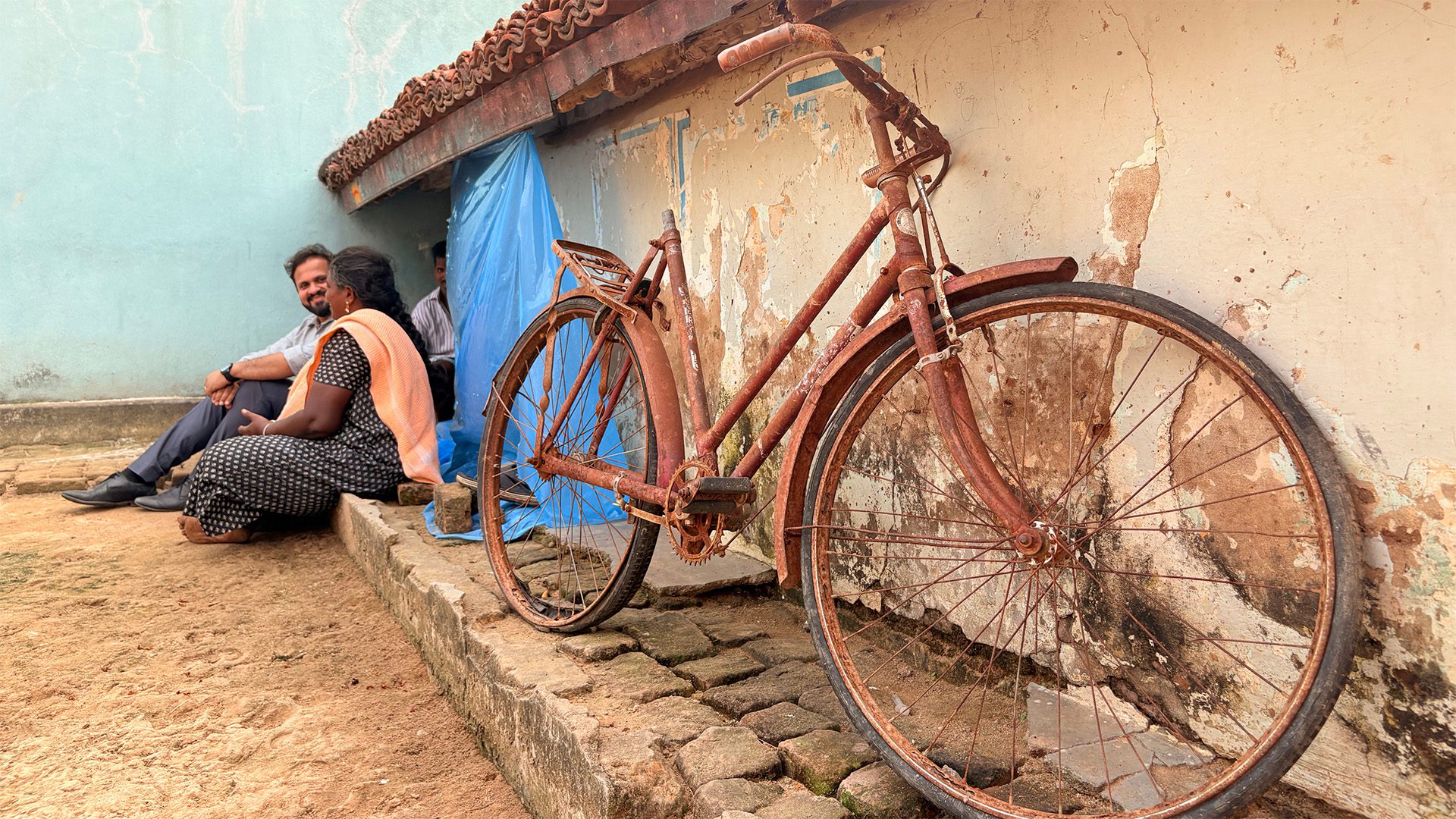Saravanan Thangarajan, Master of Medical Sciences in Global Health Delivery Candidate at Harvard Medical School, traveled to Tamil Nadu this winter to explore the impact of climate change on maternal and infant health. Supported by a Mittal Institute Winter Research Grant, he interviewed mothers struggling to protect their children from heat, air pollution, and other environmental stressors. Below, Saravanan shares findings from his research and how the experience will impact his future academic path.

Saravanan Thangarajan
Mittal Institute: What were your goals with your student grant, and why did you pursue this project/location?
Saravanan Thangarajan: This study was driven by the need to expose the largely ignored intersection of climate change and maternal health. Climate discussions tend to focus on agriculture, energy, and disaster management, while the health of pregnant women and newborns remains overlooked. In Tamil Nadu, rising temperatures, polluted air, and food insecurity are already affecting maternal and infant health. These impacts are not unique to the region—they are part of a growing global trend. The research also aimed to center lived experiences. Data can inform, but stories compel action. By traveling through Tamil Nadu’s industrial zones, drought-stricken villages, and peri-urban settlements, the study captured the daily realities of mothers facing environmental hardship. These voices must shape climate adaptation and healthcare responses.
Despite the challenges, communities in Tamil Nadu are adapting. From indigenous cooling practices to informal maternal support networks, local solutions are emerging. These responses offer valuable insights that can inform broader strategies to protect vulnerable populations facing similar threats. Tamil Nadu was selected as the study site because it reflects global patterns. It is not an exception; it represents what is increasingly occurring across the world, in both developing and developed regions, without urgent and targeted intervention.
“Climate discussions tend to focus on agriculture, energy, and disaster management, while the health of pregnant women and newborns remains overlooked. In Tamil Nadu, rising temperatures, polluted air, and food insecurity are already affecting maternal and infant health. These impacts are not unique to the region—they are part of a growing global trend.”
- Heatwaves here have intensified, mirroring conditions in regions such as West Africa, Southeast Asia, and the southwestern United States. In the study, 91 percent of mothers reported infant sleep disruptions due to heat, and 68 percent experienced reduced breastmilk supply—findings that align with data from Pakistan, Nigeria, and Arizona. These physical effects are echoed by Shabeena*, a mother who described her struggle during a heatwave: “The house turns into an oven. The power cuts make it worse. My baby cries all night from the heat, but what can I do?”
- Air pollution is another major threat. In Tamil Nadu’s industrial areas, infant respiratory issues have risen by 45 percent. This parallels conditions in places like Louisiana’s “Cancer Alley,” where pollution is linked to preterm births and low birth weights. Tamil Nadu exceeds safe air quality standards on most days of the year. Parvathy*, another mother, shared: “Some mornings, I find a thin layer of dust on his tiny hands. I wipe it away, but it always returns. He breathes it in. He coughs. I know it is harming him, but where can we go?”
- Food insecurity further compounds the crisis. In drought-hit regions, maternal malnutrition is widespread—an issue seen in the Sahel, Sub-Saharan Africa, and rural areas of the United States. Globally, one in five pregnant women faces food insecurity, increasing risks of low birth weight, preterm delivery, and maternal mortality.

Saravanan Thangarajan in conversation with a mother during his research on the impact of climate change on maternal and infant health.
These stories reflect the experiences of mothers far beyond India’s borders. The implications of this research are global. Rising heat shortens pregnancies and increases complications. Pollution undermines fetal health. Food insecurity threatens maternal and infant survival. These are not isolated problems—they are widespread and worsening. If we fail to act, maternal health will continue to deteriorate under the pressures of climate change. Infants will suffer irreversible harm. Health inequalities will deepen, hitting the most marginalized the hardest. Tamil Nadu is already confronting these realities. The question is whether the world will respond in time—not only for the mothers and babies in Tamil Nadu, but globally.
Mittal Institute: What was most impactful about this experience?
Saravanan Thangarajan: Numbers tell us that extreme heat increases preterm birth risks, that air pollution leads to respiratory complications in infants, and that maternal malnutrition heightens the risk of stillbirth. But statistics don’t cry. What struck me most in this research wasn’t the data—it was the mothers who live these numbers every day. It was Shabeena, whispering lullabies to her baby while fanning him through the night, hoping for relief from the stifling heat. “Even the darkness does not bring relief,” she told me, her exhaustion evident not just in her voice but in her sunken eyes. It was Malati, who no longer expected her child to cry for food. “A baby should cry when she is hungry. But now… she makes small sounds, like she has learned that crying will not bring more milk.” Her words were quietly devastating—proof that food insecurity steals not only a mother’s nourishment but also her child’s very instinct to hope. It was Parvathy, waking each morning to find her newborn’s skin coated in a fine layer of soot from nearby factories. “I wipe it away,” she said, “but it always returns.” Her words weren’t just about the dust; they were about the inescapable grip of pollution—one that settled not just on her home but inside her child’s tiny lungs.
As a global health researcher, I have spent years studying data, analyzing disparities, and proposing solutions. But in Tamil Nadu, I felt something I did not expect: helplessness. No matter how much I wanted to offer relief, I could not stop the heatwave suffocating Shabeena’s home. I could not make rain fall in Malati’s drought-stricken village. I could not shield Parvathy’s baby from the invisible toxins in the air. What I could do, however, was listen. Document. Amplify. And most importantly, demand that these stories be heard by those with the power to change them.
What impacted me most was the realization that Tamil Nadu is not alone in this struggle. The same heatwaves suffocating new mothers here are endangering pregnant women in Pakistan, West Africa, and even parts of the U.S. The air pollution settling on infants’ skin in Tamil Nadu is no different from the toxins harming babies in Beijing, Mexico City, and Louisiana’s industrial belt. The hunger leaving mothers unable to feed their babies here mirrors the struggles of expectant mothers in conflict zones, refugee camps, and food-insecure communities worldwide.
Tamil Nadu revealed a truth that global policymakers have yet to fully confront: climate change is not just an environmental crisis—it is a maternal health emergency unfolding in real time, everywhere. The most profound takeaway from this research was understanding that studying this crisis is not enough. Science must not remain in journals—it must reach policymakers. Data must not just be reported—it must drive urgent interventions. Mothers must not be left to adapt alone—global health systems must adapt with them.
Tamil Nadu revealed a truth that global policymakers have yet to fully confront: climate change is not just an environmental crisis—it is a maternal health emergency unfolding in real time, everywhere. The most profound takeaway from this research was understanding that studying this crisis is not enough. Science must not remain in journals—it must reach policymakers.

In Tamil Nadu, Saravanan Thangarajan witnessed various environmental hardships local communities faced.
Mittal Institute: Bring us into your daily life during your grant. What was it like? Who were you meeting? What institutions were you visiting?
Saravanan Thangarajan: Daily life during my grant in Tamil Nadu was far more layered than the typical image of research suggests. It wasn’t just about data collection and interviews—it was about navigating bureaucracy, earning trust, and sitting with mothers in moments of quiet resilience. The work began well before I entered the field, with a long process of securing ethical approvals from the Tamil Nadu State Government, Directorate of Public Health and Preventive Medicine. Since the study involved accessing maternal health records and conducting interviews with new mothers, Harvard institutional and State Government IRB approval were non-negotiable. Multiple meetings, detailed documentation, and clarifications about the purpose of the research were required. Each step reinforced that this was not abstract inquiry—this was about real lives, and their dignity had to remain at the center.
Once approvals were in place, the fieldwork began in earnest. Mornings started with visits to Primary Health Centers, the local hubs for maternal and child healthcare in rural Tamil Nadu. These centers offered a first glimpse into systemic strengths and gaps, but the true depth of experience came from home visits. With the consent of mothers and their families, I traveled across districts—into drought-hit villages, peri-urban slums, and industrial zones. I met mothers where they lived: sitting on verandas, in single-room homes, or under trees, wherever they felt most at ease. Conversations unfolded slowly, often over tea, with questions flowing both ways. These weren’t clinical interviews—they were intimate exchanges, sometimes punctuated by silence that spoke louder than words.
What shaped my days most powerfully were the stories I witnessed firsthand. In homes with tin roofs, I saw how heatwaves turned living spaces into suffocating ovens, with mothers fanning their babies through sleepless nights. In industrial zones, I watched mothers wipe soot from their infants’ skin, knowing the pollution in the air was entering their lungs. In drought-ridden areas, I sat beside women who skipped meals so they could feed their child. These moments went far beyond statistics—they were snapshots of how climate stress had embedded itself in the most personal corners of daily life.
Evenings were not a time to rest but to reflect. I transcribed interviews, wrote field notes, and mapped recurring patterns across districts. Often, a mother’s posture, her tone, or how tightly she held her baby revealed as much as her words. What became increasingly clear was that these women were adapting to climate change faster than the systems meant to protect them. Their struggles weren’t only about healthcare access—they were about navigating an environment that was becoming actively hostile to safe motherhood.
“Their struggles weren’t only about healthcare access—they were about navigating an environment that was becoming actively hostile to safe motherhood.”
Each day ended not with tidy conclusions, but with a growing sense of urgency. This wasn’t just research. It was a responsibility to carry these stories forward, to make sure they reach those in power, and to insist that solutions come before the crisis deepens.
Mittal Institute: How will this experience help you to reach your academic goals?
Saravanan Thangarajan: This experience has been a pivotal turning point in my academic and professional journey, fundamentally reshaping how I view the role of research in global health. While I came into this project with deep, firsthand experience in maternal health systems, emergency response, and climate-related health interventions, this research expanded my scope—allowing me to connect these local realities to global systems and policy frameworks. It gave me the opportunity to step into the homes of women navigating motherhood amidst environmental collapse, and to document how climate change is not a future threat, but a present crisis that is already stealing breath, milk, and safety from mothers and newborns.

Saravanan Thangarajan in Tamil Nadu during his field research.
Academically, it sharpened my capacity to design field-grounded, scalable solutions that respond not only to health outcomes but to the intersecting effects of climate, poverty, and gender inequality. It strengthened my ability to integrate qualitative insights with systems thinking—skills that are vital for my future research, policy work, and global health leadership. This experience also deepened my understanding of the ethical responsibility of scholarship: that research must be more than observation—it must be amplification.
Going forward, this experience positions me to be a stronger advocate and a more effective academic—someone who doesn’t just publish findings, but ensures they reach the ears of policymakers, healthcare leaders, and institutions that can act. Most importantly, it reaffirmed my commitment to be a voice for the millions whose stories are buried in silence—mothers whose babies no longer cry, women who endure heat, hunger, and pollution with no platform to speak. This work is not just about advancing my academic goals; it is about transforming that knowledge into justice. And that will remain at the heart of everything I pursue next.
Mittal Institute: What’s the most memorable moment from your time on the student grant?
Saravanan Thangarajan: The most memorable moment of my research did not emerge from a hospital or a dataset, but from the deeply human moments shared in quiet homes across drought-stricken Tamil Nadu. It was in these intimate spaces that the full weight of the crisis became real—not as a series of statistics or symptoms, but as a daily struggle etched into the lives of mothers navigating an environment growing more hostile by the day. I had spent months studying climate stressors on maternal health, but nothing could have prepared me for the emotional gravity of what I witnessed firsthand. In those moments, the silence spoke louder than words—the kind of silence that comes not from peace, but from exhaustion, deprivation, and the quiet adaptation to a world where even basic needs go unmet.
“I had spent months studying climate stressors on maternal health, but nothing could have prepared me for the emotional gravity of what I witnessed firsthand.”
What struck me most was not a single event, but a pattern of resilience built on endurance rather than support. These women were not only facing environmental and economic stressors—they were doing so while raising children, managing households, and bearing the mental and emotional toll of systemic neglect. The maternal health crisis revealed itself not just in the conditions they lived in, but in the things they no longer expected: rest, relief, recognition. This realization shifted the core of my research from observation to advocacy. It made clear that these are not isolated stories—they are shared realities across regions affected by climate change, demanding global attention and response.
*Names have been changed. Image Credits: Sreeaarthi RamaRao.
Note that Saravanan Thangarajan also received funding from the Harvard Center for International Development and shared his research findings in CID Voices, March 25, 2025.
☆ The views represented herein are those of the interview subjects and do not necessarily reflect the views of the Mittal Institute, its staff, or its Steering Committee.
